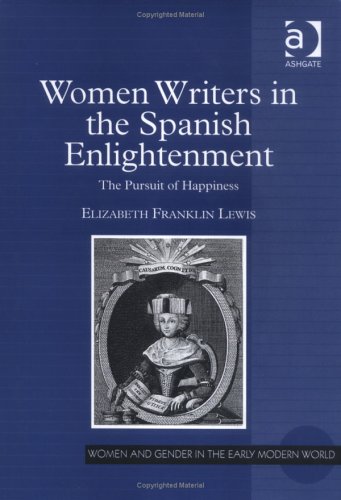Women and Gender in the Early Modern World
1 total work
Beginning with a brief examination of the importance of the concept of happiness to the European Enlightenment as well as to the growing eighteenth-century interest in women, especially in Spain, this study focuses on the literary expressions of happiness by Spanish women as exemplified in the writings of three authors: essayist Josefa Amar y Borbon, poet Maria Gertrudis Hore and playwright Maria Rosa Galvez. Author Elizabeth Lewis traces the theme of 'happiness' through the texts, explicating how important the concept is for understanding eighteenth-century culture. Lewis shows how happiness for women could be considered subversive, associated as it was (among other things) with the freedom to make lifestyle choices, with a sense of harmony that extended far beyond the domestic sphere, and with a feminine virtue that defied traditional notions of fidelity to God and husband, and instead encouraged responsibility to other women, especially to future generations.
Because notions of eighteenth-century happiness represented a challenge to the embedded power structures of the Church, the State, and the male intellectual elite, women therefore faced a dilemma well worth examining: how best to express their ideas on female happiness, how to procure their own happiness and that of their sisters without risking alienation or even castigation for their words and actions. Although largely ignored in the past, the time is ripe for an extensive and serious analysis of eighteenth-century female-authored texts. Through its focus on the concept of Enlightenment women's pursuit of happiness, this study points to both the importance of this period to the history of women's literature in Spain and the importance of women's literature to the history of the Spanish Enlightenment.
Because notions of eighteenth-century happiness represented a challenge to the embedded power structures of the Church, the State, and the male intellectual elite, women therefore faced a dilemma well worth examining: how best to express their ideas on female happiness, how to procure their own happiness and that of their sisters without risking alienation or even castigation for their words and actions. Although largely ignored in the past, the time is ripe for an extensive and serious analysis of eighteenth-century female-authored texts. Through its focus on the concept of Enlightenment women's pursuit of happiness, this study points to both the importance of this period to the history of women's literature in Spain and the importance of women's literature to the history of the Spanish Enlightenment.
